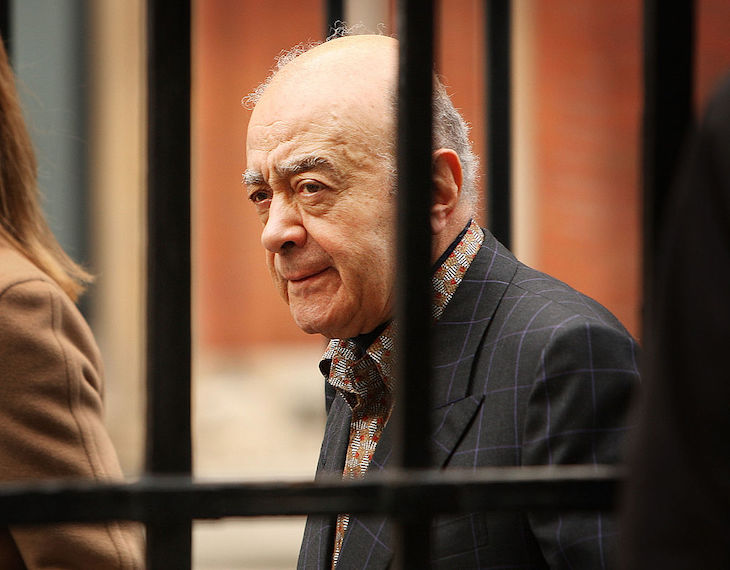The allegations against Mohamed Al Fayed are dreadful: the former Harrods owner has been accused of raping five women and sexually abusing at least 15 others when they worked at his department store. A BBC investigation, which detailed the allegations, claimed that this abuse took place from the late 1980s to the 2000s.
The name of the ‘phoney pharoah’, as Private Eye so aptly christened him, should live in infamy forever
The consistent thread of the allegations against Al Fayed – who died last year aged 94 – was that he used his power and wealth to target women who worked for him at Harrods. Al Fayed, it seems, had a well-established modus operandi; he would prowl the floors of his store, looking for assistants or workers whom he found attractive. When he did, he would ply them with champagne before forcing himself on them. On occasion, he would take them to the former Parisian home of the Duke and Duchess of Windsor, Villa Windsor, and rape or assault them there. As one victim of his, Sophia, succinctly put it, ‘He was vile.’
Al Fayed was always regarded with suspicion and distaste by the British establishment during his lifetime, and with good reason. Although he won a degree of public sympathy when his son Dodi was killed in the same car crash in 1997 that ended the life of Princess Diana, this sympathy soon evaporated when he made consistently false and self-publicising claims about the Royal Family’s complicity in his son’s death. He had a particular obsession with the idea that Prince Philip had masterminded the conspiracy, and would discuss the subject vociferously and tediously when given the slightest opportunity. He was a baleful, corrupt presence in public life, who achieved notoriety for bribing Conservative MPs with envelopes of cash to ask questions on his behalf in the House of Commons. For some bizarre reason, his actions were not believed to amount to a crime worth prosecuting.
If the allegations against Al Fayed are true, it is clear that this was a man who should have rotted in prison. Questions must be asked how this mysterious, mendacious figure was able to use his wealth and connections to come so close to the Royal Family and within an inch of becoming father-in-law to the most popular former member of ‘the Firm’. We now know that, even as he was scheming his way into positions of influence, he was raping women with impunity, secure in the knowledge that his wealth and power would protect him from the reckoning that he so richly deserved.
It is inevitable that, after the first flood of allegations, there will now be a torrent of further distressing stories about his behaviour. The new owners of Harrods can expect to be paying many millions in pounds in compensation for assaults that took place at the shop when he owned it. But financial reparations by themselves will only go so far. The name of the ‘phoney pharoah’, as Private Eye so aptly christened him, should live in infamy forever, alongside Jimmy Savile. His memory should be one of contempt.
In the last two seasons of The Crown, Al Fayed appears as a major character, played by the actor Salim Daw. Although Al Fayed is introduced with classic villain music, all sinister chanting and drumming, he is portrayed at least semi-sympathetically in the show as someone who might be a Machiavellian schemer but is also a loving father and a tough, if unscrupulous, businessman. For all The Crown’s much-criticised sensational elements, it is now increasingly clear that its representation of Al Fayed was, in fact, far too generous, even rose-tinted. Al Fayed was a monster, a rapist and sexual predator, and it is astonishing, a year after his death, that the stories of his behaviour were not more widely known during his lifetime.







Comments